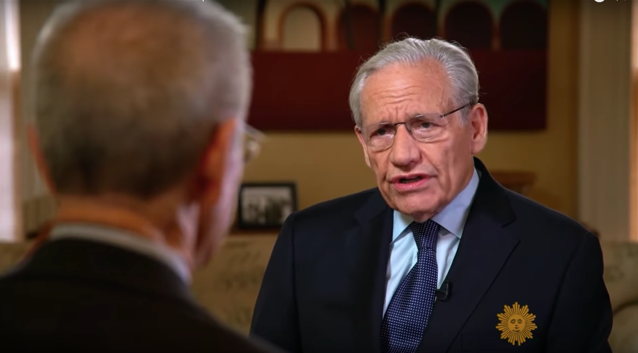Watergate reporter Bob Woodward was in his first TV interview with CBS News on Sunday for his new book, "Fear: Trump in the White House," revealing Trump administration in disarray.

"You look at the operation of this White House and you have to say, 'Let's hope to God we don't have a crisis,'" said Bob Woodward.
Woodward said aides literally stole documents off the president's desk in the Oval Office so that Trump could not sign them, such as a letter terminating a trade agreement with South Korea, "because they realized that this would endanger the country.” He added: “[Trump] doesn't remember. If it's not on his desk, if it's not immediately available for action, it goes away.”
Unelected officials like Cohn and Porter intentionally thwarting the actions of the elected president – the exact reverse of what a White House staff is supposed to do.
This is the ninth White House Woodward has covered. "In the eight others," he said, "I never heard of staff in the White House engaging in that kind of extreme action."
According to Woodward, President Trump is obsessed by the fact that the U.S. pays $3.5 billion a year to station troops in South Korea as a first line of defense against the North. “I don't know why they're there,” he said at one meeting. “Let's bring them all home.” At another meeting, Secretary of Defense James Mattis starkly said: “We're doing this in order to prevent World War III.”
In Woodward's telling, Trump does not see America as the indispensable nation; he sees it as an international sucker taken advantage of by allies and trading partners.
On the standoff between the US and North Korea, then-White House Staff Secretary Rob Porter once asked the president if the "Little Rocket Man" on Twitter might provoke Kim. Woodward told CBS the president replied, "It's leader versus leader, man versus man, me versus Kim."
The most dangerous moment of the standoff, Woodward said, came with the president's tweet: "He drafts a tweet saying 'We are going to pull out dependents from South Korea ... Family members of the 28,000 people there.'"
It was a tweet that was never sent, because of a back channel message from North Korea that it would regard a pullout of dependents as a sign the US was preparing to attack. "At that moment there was a sense of profound alarm in the Pentagon leadership that, 'My God, one tweet and we have reliable information that the North Koreans are going to read this as an attack is imminent,'" Woodward said.
Trump accused Woodward's book as a "fake book". When asked, "Are you ready for a tweetstorm directed at you?" Woodward replied: "I've been there before."
Woodward's Watergate stories in the 1970s also let Press Secretary Ron Ziegler to say that the Washington Post Woodward worked for was practicing "shabby journalism". But the White House was forced to apologize.
Woodward said he had multiple sources for every claim in the book and there were multiple interviews with key witnesses. Among the hundred people he interviewed for the book, half of them are key people. "One person I interviewed nine times, and the transcripts of those conversations are 700 or 800 pages," Woodward said.
After excerpts of "Fear" began to leak ahead of its official publication, many book-related officials denied their harsh criticism of the president quoted by Woodward. Woodward said in response: "My reporting is meticulous and careful."
"Fear" is Woodward's nineteenth book. Working on it made Woodward recall his youth days with Carl Bernstein when they made late-night visits to the homes of potential sources for the Watergate scandal.
Carl Bernstein told CNN that "Fear" is "astonishing detail piled upon detail, of meetings, of memoranda." He thought the level of detail and number of sources distinguished "Fear" from past reporting about the president.
An anonymous op-ed published in the New York Times last week, echoing the theme of Woodward's book that aides fear what the president might do if allowed to follow his impulses. When asked if he knows the author's identity, Woodward said: “I have no idea who it is.”
He said that without details like “dates and times and participants” on the op-ed author's story, "I wouldn't have used it." In Woodward’s telling, the op-ed is “too vague”, and it does not “meet the standards of trying to describe specific incidents.”
(Sources: CBS and CNN; Compiled by Xu Ya-nan)


